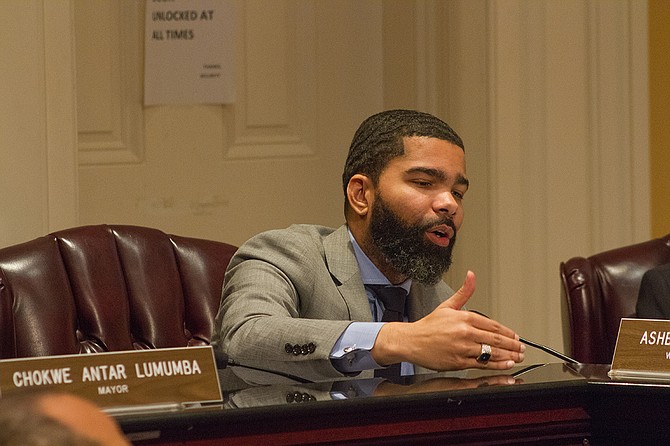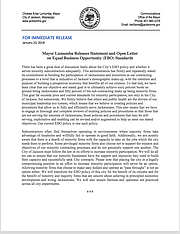Mayor Chokwe A. Lumumba wants to develop a contract compliance office to oversee City contracts. Photo by Stephen Wilson.
*Note: The Jackson Free Press received some contracts for this story this morning. This article will be updated once we review the documents.
Arneedra Smith-Gaddis seemed nervous when she stepped to the microphone in City Hall on Jan. 3, but Bridgette Gandy looked more composed. The two women subcontractors were there, separately, to tell the Jackson City Council that a local construction company had cheated them out of money paid through a municipal contract.
"It's been so many rumors and lies," Smith-Gaddis said to the council.
Both women complained that Renna Fisher of Fisher Construction and his business partner and vice president, Jacqueline Andrews, had not paid them each tens of thousands of dollars.
(Andrews is listed on the secretary of state's business directory as Jacqueline Williams, but was not present in City Hall.)
Fisher Construction is a subcontractor for the larger Mass.-based company, Veolia North America - South, LLC. In October 2016, the council approved a $10,930,464 contract with Veolia to manage and operate Jackson's wastewater-treatment plants to ensure compliance with the U.S. Environmental Protection Agency's consent decree with the City to improve wastewater-treatment practices, which at one time included dumping untreated wastewater into the Pearl River.
Smith-Gaddis and her husband, Cornelius, both work on trucks hauling sludge out of the Savanna Street Wastewater Treatment Plant in Jackson. At the Jan. 3 meeting, she told the council that Fisher Construction owes her family $20,000. The Jackson Free press requested the subcontracts under Fisher, but the City did not release these documents by press time. She prefaced her three-minute speech with the disclaimer that she was not the best talker.
"(Fisher) kept saying that Veolia hadn't paid him and (was) the reason we hadn't got paid, so I knew there was something fishy about that," she said. When she returned to her seat, she looked at her husband and asked if she had done a good job. They nodded together, and she sat back on the wooden benches in the council chambers to listen in on the rest of the meeting.
Gandy was up next. She owns her own environmental consulting business and told the council that Fisher had only paid her $12,000 for five months of work, although her contract was for $10,000 a month. The JFP did not confirm that number because the City did not return a public-records request by press time.
"It's disheartening for me, too, because (Fisher and Williams) took me under their wings, me being a minority company, a woman trying to grow," Gandy said. "I thought I was doing something great, doing something great for the City of Jackson working for Veolia."
Though the women said they did not know each other prior to the meeting, their shared testimony was the second public signal that something was up with the Veolia contract.
The first hint came late last year when the city council voted to withhold Veolia's funds from the claims docket at its Dec. 19 meeting until it could further investigate complaints about the company and a subcontractor. At its first meeting of 2018, Veolia's legal counsel and some employees showed up, and the council voted to release funds to the company. That was the same meeting Gaddis and Gandy came to speak on the record about Fisher Construction not paying them.
Turns out, Fisher had his own allegations about payment that escalated into a hearing in front of the City's Equal Business Opportunity board on Jan. 12, where Fisher passed the blame back up the chain to Veolia. He claimed the company had only paid him $700,000 of the approximately $1.4 million for which he said he was contracted, and that was why he had not paid the women more money.
Web of Confusion
Fisher's, Gandy's and Gaddis' allegations highlight the complicated web of contractors with the City Jackson and the problems that result despite the City's policies to help minority businesses grow.
Companies bidding for contracts must include an equal business opportunity plan with the breakdown of the percentages of Asian-owned, African American owned, Hispanic-owned, Native American-owned and women-owned businesses that will help carry out the work. This process is written into Jackson's ordinances as a protection for those groups historically left out of business deals. Veolia is one such company that committed to "exceed" the city's minority and female enterprise contracting goals.
The prime contractor—the larger company seeking the contract with Jackson—can employ minority-owned businesses as subcontractors, suppliers, joint ventures or mentor-protege programs. If a subcontractor or supplier is not performing, the prime contractor is supposed to replace the subcontractor with another minority-owned business.
Jackson officials tend to break down the City's commitment to helping minority-owned businesses secure participation in public contracts with analogies.
Ward 2 Councilman Melvin Priester Jr. equates it to shopping locally: "Hiring locals is our version of shopping local, making sure we look out for small businesses, specifically disadvantaged, minority-owned businesses," he said.
The mayor likens the practice to simple economics—you have to provide jobs and help businesses that reflect the population. "If 85 percent of the population is left-handed, you need left-handed jobs," he said to reporters following a press conference on EBO practices on Jan. 23.
Equal business opportunity plans are admirable—in theory, they ensure that contracts benefit people other than the white men who traditionally get them. But, if no one is reviewing contracts after the ink dries, then everyone is operating on the assumption that large companies are operating in good faith without verification.
"We see people at the beginning of the process when it's all 'Kumbaya,' and we're working together," Priester said. "It's only when the contracts reach a boiling point that we are called in to referee. But, this is why we have courts."
In the Jan. 23 press conference at City Hall, the mayor uncharacteristically read from a prepared statement defending the City's EBO policy and how it serves subcontractors, presumably to ensure he checked the right legal boxes.
"[W]e have been clear that our objective and stated goal is to ultimately achieve 60-percent boots on ground being Jacksonians, and 50 percent of the subcontracting makeup being minority firms," Mayor Lumumba said.
But there's also the reality that many minority-owned businesses do not have the capacity to take on jobs the City is trying to fill—such as owning trucks or tractors; having adequate staff; keeping good accounting. The City's EBO policy should help these businesses develop that capacity.
Disputes within chains of municipal contractors including primes and subs are not unusual in Jackson, and the lack of transparency often keeps a broken system out of view of the taxpayers whose money is in dispute. That means the public is often not aware of many of the controversies surround the same players, whether what the city allowed in contracts, the amounts of taxpayer money paid to primes and subs, or who does or does not do the actual work.
The big dollars at the top of the City contracting food chain may not always make it down to the people who are doing the work. The most publicly contentious disputes have been over contracts signed to respond to the City's 2012 consent decree with the Environmental Protection Agency. Siemens Industry Inc. is another large company working on the consent decree. It oversees new water meters in Jackson, but with customers complaining about water bills in the thousands, the city council authorized a lawsuit against the company at its Jan. 18 meeting.
"All of this stuff ties together with our wastewater treatment—the Siemens contract, the consent decree with EPA is linked together," Priester said. "All these different companies play their own role in helping Jackson rise or move forward."
Veolia vs. Fisher
The City's Equal Business Opportunity Board held an afternoon hearing for Veolia and Fisher Construction on Friday, Jan. 12. Fisher claimed the contractor promised to pay him approximately $1.4 million, but he says he has only received around $700,000 to date. His lawyers contend that Fisher relied on that $1.4 million "to his detriment," and that he has not been able to pay his own workers as a result—such as Gandy and the Gaddises.
"There's been a steady stream, a drip, drip, drip of what I submit are bad-faith communications from Veolia for various reasons," said one of Fisher's lawyers, Wilson Carroll of Jackson.
Veolia's legal representative, Bobby Owens, told the EBO board that Fisher "absolutely" would have gotten paid closer to that amount if it had not been so rainy last year because the company could have paid him to do land application—the process of taking sludge from wastewater plants and repurposing it as fertilizer. This cannot take place when it is raining outside because of the risk of toxic runoff.
"It was close to the wettest year in history," Owens said. "Land application is about half of the contract. The more land he applies, the more he gets paid—I'll just stop there."
A spokesperson in Boston for Veolia said the company "had no choice" but to end their relationship with Fisher, whom they since replaced with a different minority-owned business, Four Seasons Enterprises of Jackson. John Lamontagne of Veolia said the company advanced Fisher money at the start of the contract with the understanding that he would lease the equipment required to perform the work. But, at least by Veolia's standards, Fisher did not remove caked sludge in a timely manner, nor did he provide the tools, labor or equipment to perform adequately, Lamontagne said.
At the hearing, Fisher said he wanted to do work for Veolia in the future. However, Owens said the relationship is "irretrievably broken" because he believes Fisher breached his contract on several terms, including hiring subcontractors to fulfill contracted work he promised to do—a standalone breach compounded by allegations that Fisher did not then pay those subcontractors in full.
The Jackson Free Press filed a public-records request with the City on Jan. 18 for the contracts between Veolia and Fisher and any subcontractors. We received them this morning, and will update the story when we review them.
About a week after the EBO hearing, some employees from Fisher Construction as well as Fisher and one of his attorneys, Regina (Quinn) May, spoke to the city council at its Jan. 18 meeting.
May said Veolia had shut out Fisher from doing work, and while she was satisfied with the EBO hearing, she wanted to provide the council members with his side of the story.
Fisher brought a box of papers filled with haul tickets as proof of his "good work" over the years. He called Veolia pushing him out "distasteful" and referenced Martin Luther King Jr.
"(King) paid the price, but now here I am a minority contractor, and I can't even work in the city that I live in, it's not fair ... the days of the past is over," he said.
In response, Mayor Chokwe A. Lumumba said he believes there are instances when minority firms get "hustled," but the City has to be sure it can legally insert itself. In Fisher's instance, he did agree that "there are some issues that should have been addressed," but did not elaborate further.
At the same meeting, Ward 6 Councilman Aaron Banks went as far as to allege past collusion within the City's public works administration on contract work, and then pushed for a disparity study to learn exactly what is getting what contracts. "We've got to tighten up," Banks said. "And I said collusion, and I believe it's going on."
Priester, an attorney, edged the conversation to a close because of the legal risk of speaking about the Veolia and Fisher circumstances in a public forum. "We're having a generalized discussion about what should be the policy of the City, while faced with a very specific case of a contract between the City and a contract between a prime and a subprime," Priester said.
"This is one of those areas where this is not the forum for this, it just isn't. And all I care about as a city council person is making sure we don't let the mistake of having fights in the wrong forum prevent us from getting the outcome that is best for the citizens of Jackson."
Banks, who was present for part of the EBO hearing, shamed the practice of minority-owned businesses pitting themselves against each other. "My question is why is it until after Fisher files a grievance with Veolia does everyone have complaints?" Banks said.
Lumumba echoed Banks' sentiments about bickering minority firms weeks later at a Jan. 23 press conference held specifically to address EBO and contracting policies. "Some privileged minority firms also choose not to support the mission and objectives of our minority contracting process and do not genuinely support one another," Lumumba said at the presser.
While the working contract between Veolia and Fisher is likely beyond repair, they both agreed to let the City's EBO board mediate the dispute. Director of Public Works Bob Miller, the mayor's Chief of Staff Safiya Omari, Chief Administrative Officer Robert Blaine and Nakesha Watkins of the city attorney's office all sit on the board with Director of Planning and Development Mukesh Kumar as its chairman. The EBO office moved back under the direction of the planning department in recent weeks.
Now all parties involved await a decision from the mayor about how to proceed with mediating the companies' disputes, slated to arrive by Friday, Feb. 2.
Tangled Water Contracts
The City's public-contracting woes long predate Veolia. In 2008, the City did not initially want to give a contract to United Water Services Mississippi, but the company challenged the City in court and won, locking the City into a costly contract. United Water's proposal was between $1.83 million and $2.6 million over five years, while Jackson Water Partners' final proposed contract would have cost between $2.6 million and $3.4 million, the JFP previously reported.
Then-Public Works Director Thelman Boyd—now the vice president of municipal contractor Mac & Associates—wanted to go with Jackson Water Partners because it had previously worked for the City. Socrates Garrett, a local businessman who would later support Tony Yarber for mayor, then formed Jackson Water Partners, alongside Severn Trent Services.
In its lawsuit, United Water alleged that the city violated state law by disclosing its bid and giving Jackson Water Partners an opportunity to beat it.
United Water won the contract with the City through Oct. 31, 2015.
Because of the late Mayor Chokwe Lumumba's unexpected death, the search for a new wastewater-treatment plant operator fell to the Yarber administration.
The old deal with United Water was a cost-plus-fixed-fee contract, meaning United Water got a fixed fee for work it did plus a bonus if it spent less than budgeted. United Water's contract did not provide for any of the work requirements in the consent decree, which came about midway through the United contract.
Overall, the fixed-rate Veolia contract was a better deal for the City.
By the time the Veolia proposal landed in the council's lap, its members might have already felt the effects of contract fatigue. Yarber came into office in 2014, with the support of Garrett, who had contributed at least $30,000 to the campaign—a third of which was a loan. About a half-year into Yarber's tenure, a solicitation for a bio-solids management firm went out. The choices for council were Denali Water Solutions working with Garrett locally as a venture partner, or Baltimore-based Synagro-WWT Inc. working with Fisher Construction.
After The Northside Sun published a story titled "City Allegedly Steering Bid to Major Contributor," Yarber told the council that his staff was not responsible to any "contractor past" or ensuring they get work with the City. Garrett agreed in a telephone interview this week.
"Contracts are not something that you can be entitled to," Garrett said in the Jan. 29 phone conversation. "... What I'm entitled to is to have an opportunity in a fair, competitive environment to win or lose based upon my merits."
Ultimately, after a great deal of controversy, the council voted not to approve the Denali-Garrett proposal on Sept. 17, 2015, and days later, Yarber pulled the contract from consideration. The United Water contract was extended a calendar year to give the City more time to do the proposal process again.
Meantime, a lawsuit was brewing. Stephanie L. Coleman, whom Yarber appointed as the City's equal opportunity business manager in January 2015, filed suit against the City, Yarber and several John Does in February 2017. Coleman claims her immediate supervisor asked for sexual favors so she could keep her job. She also said she had discovered a "pay-to-play" scheme to steer city contracts, and alleged that her refusal to participate in the game cost her the job.
Yarber denies all allegations, and the trial is set for June 18, 2018, in Judge Henry Wingate's courtroom in Jackson.
The lawsuit named Atlanta businesswoman Mitzi Bickers as a friend of Yarber's and a campaign donor who allegedly told Coleman "that the mayor wanted to express his gratitude for her service by allowing her to participate in a few upcoming major contracts," the lawsuit reads.
Bickers felt entitled to the EPA consent-decree management contract with a partner of her choosing, and she needed Coleman to make the paperwork look good enough so she could get it, Coleman claims in the suit, which represents one side of a legal dispute. But Coleman said she did not find Bickers qualified or experienced enough to handle the projects.
Coleman also sat in on the evaluation committees that weighed the Denali-Garrett proposals with those from Synagro-Fisher. "The scoring criteria was changed and scoring sheets were altered to justify awarding the contract to the Denali-Garrett team, which included the mayor's campaign-finance chairman, although the competing proposal from Synagro-Fisher was more than $1,000,000 less and received a superior rating from the evaluation committee," Coleman's lawsuit claims.
Then-Public Works Director Kishia Powell and Consent Decree Attorney Terrell Williamson were named in the lawsuit for making "disparaging statements" about the Synagro-Fisher team to "discredit" the strength of their proposal. Powell would deny in an interview with the Jackson Free Press that they had changed the scoring criteria with Powell saying directly that "I don't steer" contracts.
In September 2015, Powell told the council that Synagro-Fisher's proposal lacked detail and "lessened our confidence in the price they proposed, nor did it indicate a disposal fee with landfills or specific transportation routes. "One team laid out a specific proposal with travel estimated times and mileage, which gave us more confidence in that proposal," Powell said about the Denali-Garrett proposal in 2015.
Garrett now points to the unfairness of targeting his proposal, making it clear that he believes it was because he supported Yarber's election. "Is that an issue if someone is contributing to a candidate of your choice?" Garrett told the Jackson Free Press. "Should everybody that contributes to a candidate of their choice be eliminated from participating in economics, contracts? That's a new rule? Or is it just a rule that applies to those that you don't like?"
While Jackson is a capital city, it sometimes has a small-town feel. Its contract and water issues, and associated people, are no exception. Wilson Carroll represents Coleman in her lawsuit against the City, which is ongoing, and he has long been the co-counsel for Fisher Construction.
From Flint to Jackson
Jackson and Flint, Mich., share several similarities. They're predominately black, have similar-sized populations, struggle with aging pipes and shrinking budgets and have contracted with the same water company, Veolia North America, in different capacities.
One day after news broke about lead in a university's water, the City of Flint announced it had hired "urban water experts" from Veolia to assess how the water was tested and distributed and offer a full review of the system. The March 2015 report finds that "aging cast-iron pipe has compounded the situation," and the company provided a list of recommendations and estimated costs of the next necessary steps.
As the finger-pointing, legal accusations and investigations intensified over the next year, Michigan Attorney General Bill Schuette filed a lawsuit in June 2016 against Veolia as well as Lockwood, Andrews & Newnam Inc., a company brought in to address water issues, for allegedly making matters worse in Flint.
Schuette accused Veolia of making fraudulent statements regarding the safety of Flint's water supply, which allegedly "caused widespread exposure to lead and resulting lead poisoning."
Veolia's March 2015 report said the water in Flint was in compliance with federal and state regulations. Flint followed Veolia's recommendations to protect pipes from corrosion, and Schuette alleges in the lawsuit that these practices "continued and worsened" the Flint water crisis.
The day after the lawsuits were filed, Veolia called the allegations "outrageous." When Veolia raised potential lead and copper issues, city officials and representatives silenced them and told them to exclude it from the scope of their work, the statement says. Veolia also said that the Governor's Task Force exonerated it from any involvement in the Flint water crisis.
The state's lawsuit against Veolia was dismissed without prejudice in December 2016. However, in a different federal lawsuit against Flint and Michigan state officials, the judge is allowing plaintiffs to bring negligence claims against Veolia, the Flint Journal reported.
In the midst of this controversy, the City of Jackson was taking the steps that ultimately led to Veolia winning the $10-million contract. The Yarber-era council received four proposals, and after Veolia tied with American Water Enterprises for the number-one proposal, the council chose Veolia. Even if the council members did not like the open lawsuits against Veolia, they chose the best rate, preferring not to face another United Water debacle.
Seeking Solutions
Socrates Garrett had contracts with Jackson for decades, and now "not a dime" of his income comes from City deals, he says. Garrett believes he was pushed out "systematically" because he chose to support Yarber.
Beyond the politics, Garrett's thoughts about the City's EBO mirror the current administration's belief that there are no "teeth" in the program, only rhetoric. For him, the top priority is to assist and mentor minority businesses into being able to add needed capacity so tax dollars stay in Jackson.
"It's not just an individual problem of a business person because he doesn't have capacity," Garrett told the JFP. "It affects everybody. It affects the schools; it affects the streets. Do you like the streets you ride on? The conditions of the schools? ... If you don't like what you got, you need to recruit businesses...."
Public Works Director Bob Miller said he has not yet determined what his office will do with contracts, nor has he had time to consider it with water-main breaks dominating the entire month of January.
The mayor has said the City needs a contract compliance office because to date the City has done a poor job in following up, he said. "Subcontractors often find themselves operating in environments where majority firms take advantage of loopholes and wilfully fail to operate in good faith," he said in a Jan. 23 open letter on EBO standards.
Lumumba said the contract office would need to be more than just one or two people dealing with the amount of contracts the City has entered.
"Having one person in a room that is peeking at a stack that is taller than this ceiling will never reap the benefit of what we're trying to accomplish," Lumumba said on Dec. 19."I think that's too daunting of a task for one individual to accomplish."
Kind of like a woman hauling sludge and not getting paid for it.
Email city reporter Ko Bragg at ko@jacksonfreepress.com. Visit jfp.ms/contracting.
More like this story
More stories by this author
- City Wants State’s Help Recouping Funds
- Wise Women: A Mother-Daughter Judicial Legacy Continues
- $1 Million Grant from FTA Will Help City Develop Transportation Corridor
- UPDATED: Former JPD Chief Vance Running Against Beleaguered Hinds County Sheriff
- With 84 Homicides in 2018, City Hopes to Stem Violence With New Cops, Strategy









Comments
Use the comment form below to begin a discussion about this content.